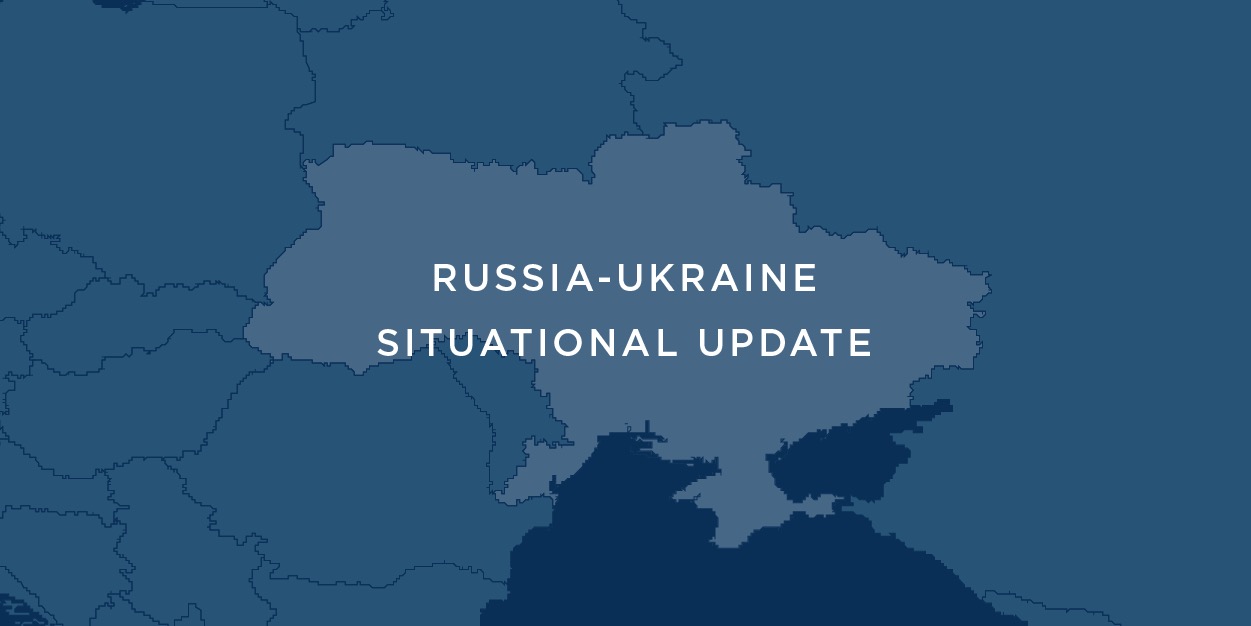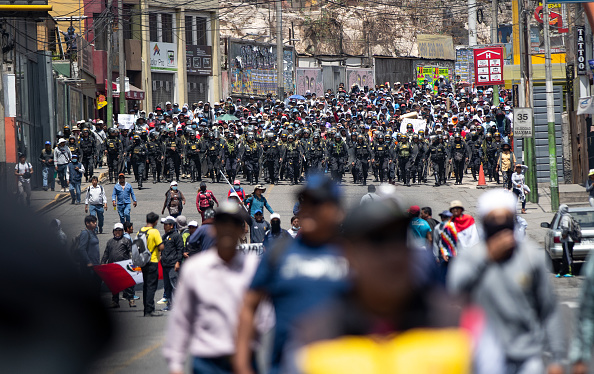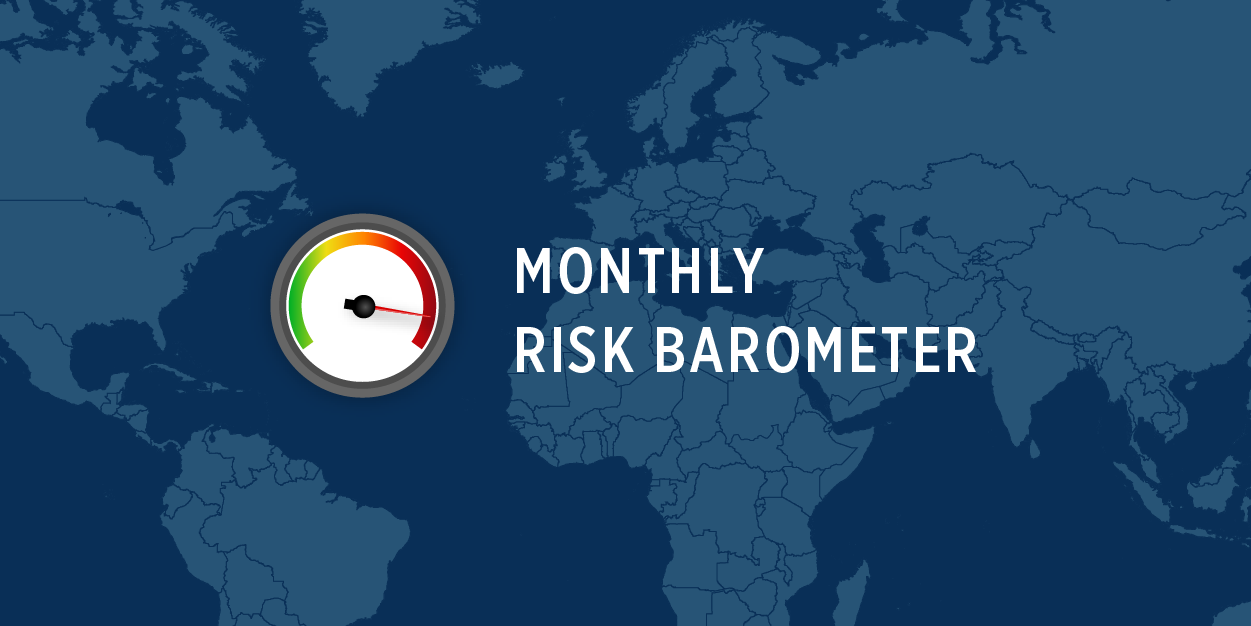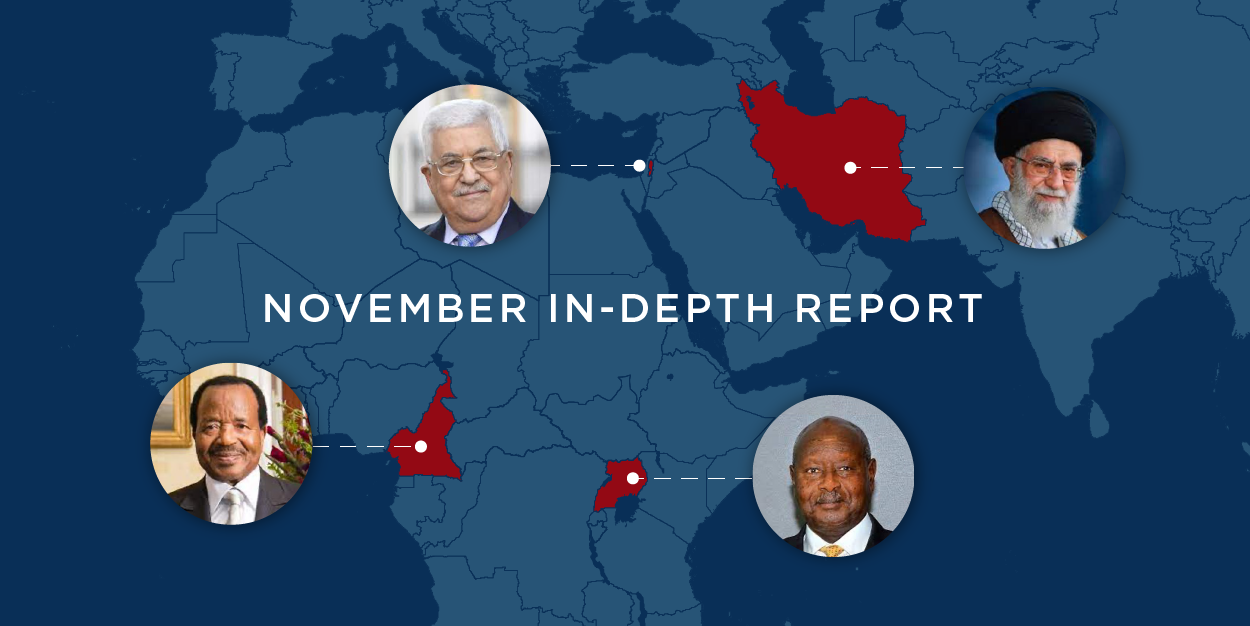In Global Guardian's monthly Risk Barometer, our Intelligence Team highlights current global hotspots with the potential to impact your business operations and travels. Read below for analysis on the threats we are closely monitoring this month and click here to subscribe for regular intelligence updates, including this monthly report.
Stability Continues to Decline Amid Khan Assassination Attempt and TTP Violence
Pakistan is currently facing a three-headed crisis with all signs pointing towards a precipitous decline in the country’s stability. In November, former Prime Minister Imran Khan was targeted in a botched assassination attempt and the Tehreek-e-Taliban Pakistan (TTP) ended its ceasefire with the central government amid an escalation in its attacks. We expect the overall security landscape to further deteriorate in the lead up to the 2023 general elections—which will serve as a flashpoint.
On the economic front, Pakistan’s low foreign exchange reserves along with rising debt raise questions about default as the country is already suffering from food and energy shortages. This is especially challenging in the aftermath of devastating floods which killed over 1,700 people and led to over $30 billion in economic damage and loss. On the security front, there has been a 24% year-to-year increase in terror attacks and the TTP has recently ended its ceasefire with the Pakistani government, vowing to shift its strategy from defensive to offensive. Meanwhile, former Prime minister Imran Khan is continuing his “long march” in what may be the greatest challenge to Pakistan’s political system since the country’s inception.
- Global Guardian continues to warn against all travel to Balochistan and Khyber-Pakhtunkhwa provinces, as well as the areas of Azad Jammu and Kashmir (AJK) and Gilgit-Baltistan near the Line of Control (LoC).
- In addition, Global Guardian recommends monitoring the political situation with an eye towards the protest situation ahead of all travel to Pakistan.
Context
Pakistan’s military establishment is the most powerful stakeholder in Pakistan, with an outsized influence over politics and the national economy. Pakistan has been overtly led by four different military rulers under three separate military coups during the periods of 1958-1977, 1977-1988 and 1998-2008. To date, no Pakistani Prime Minister has completed a full term in office. In March 2022, opposition parties, including the Pakistan People’s Party (PPP), submitted a no-confidence motion over Khan’s alleged economic mismanagement, disregard for procedural norms, and most importantly, his major foreign policy rift with the military. The bid was successful, and Khan was forced to resign in April. Since then, Khan has been holding rallies, demanding early elections and deriding the military’s control over politics.
In October, Khan began a ''long march''—a series of demonstrations from Lahore to Islamabad—to demonstrate his popularity in a bid to pressure the sitting government into calling for snap elections. Khan has blamed the military and ruling PPP party for the failed attempt on his life.
Notable Events
- 21 August – Khan’s speeches are banned from broadcast by Pakistan’s media regulator. A court rescinded this ruling the following week.
- 22 August – Khan is charged with “terrorism” for allegedly threatening a female judge who had brought sedition charges on his close aide. In September, a Pakistan court ordered police to drop investigations into the terrorism charge.
- 25 August – Pakistan declares a State of Emergency over intense flooding.
- 21 October - Pakistan’s election commission disqualifies Khan from holding public office after holding him guilty on corruption charges.
- 03 November – Former PM Khan is shot in the leg during a protest march in a failed assassination attempt in Wazirabad, Punjab.
- 28 November – Tehreek-e-Taliban Pakistan (TTP) ended the June ceasefire and urged its fighters to carry out attacks across Pakistan.
Looking Forward
So far, the military has taken several measures to sideline Khan after promoting his ouster. It has attempted to silence him and bar him from running. But the military has fallen short. Khan’s party is now the most popular party in Pakistan which brings political dangers should the military resort to its old methods of coups and assassinations. Thus, the military is in a bind: if it overtly intervenes and kills or imprisons Khan, it validates Khan’s arguments against the military; if it doesn’t intervene, Khan could be democratically elected which would draw Pakistan’s civil-military spat into the spotlight, likely resulting in major conflicts in the courts who already have little legitimacy. Either way, in Pakistan’s current economic climate, the looming showdown between the military and Khan will lead to further unrest and political turmoil. Both parties benefit from, and will seek to leverage, the country’s worsening security situation.
KEY TAKEAWAYS Pakistan is entering uncharted territory. Never has the ruling regime faced as acute a political threat amid the backdrop of a worsening economic and security situation. It is unclear how far the military establishment is willing to go to prevent Khan’s political comeback. What is clear is that both political risk and security risk are rising in Pakistan in the near term. |
Istanbul Attack and Proposed Invasion Portend Increased Terror Risk
There is an increased risk of terror attacks in Türkiye following the 13 November bombing in Istanbul. Ankara has attributed the attack to the Kurdistan Workers Party (PKK) and the affiliated Kurdish People’s Defense Units (YPG) based in northern Syria, though these groups continue to deny any involvement in the attack. On 20 November, the Turkish military commenced an air campaign on Kurdish militant targets across Iraq and Syria dubbed Operation Claw-Sword. Türkiye now appears poised to launch a major ground campaign in northeast Syria. A Turkish invasion could lead to a resurgence in bombings like that of 2015-2016 when Kurdish armed groups twice struck Ankara, while suspected Islamic State (IS) suicide bombers attacked Istanbul on three occasions.
On 13 November, an improvised explosive device (IED) detonated on Istiklal Street, a busy pedestrian shopping street near Taksim Square in Istanbul. At least six people were killed and 81 were injured in the blast. Event footage displayed an unattended bag next to a bench as the likely IED. Within 24 hours of the attack, Turkish authorities carried out 21 raids arresting over 50 suspects, including the prime suspect, a female Syrian national who allegedly confessed to association with the Kurdistan Workers Party (PKK). Verifiable details about the plot, suspect, and conspirators are scant and the details that have been released are politically convenient for President Recep Tayyip Erdoğan.
While political violence and terror attacks have become commonplace in the south, Türkiye’s urban centers have remained mostly free of serious security incidents for the last five years. Overall, the 13 November attack and the risk of future attacks highlight the need for close protection officers when traveling to Istanbul or Ankara. Global Guardian continues to advise against all travel to Gaziantep, Şanlıurfa, Kilis, Hatay, and Mardin provinces in southern Türkiye.
In addition, we urge travelers going to Türkiye to:
- Expect heightened security government infrastructure, tourist attractions, transport hubs and commercial establishments, such as restaurants and malls, in Istanbul and other urban areas nationwide.
- Maintain a high level of vigilance and report any suspicious packages or behavior to authorities.
- Beware of unattended baggage or packages left in any location.
Analysis
With Türkiye’s June 2023 presidential election looming, the timing, method, and motives for the attack leave more questions than answers. IS does not normally employ such tactics and it is curious why the PKK and its affiliates would seek to intensify their conflict with Türkiye now, given that President Erdoğan has been threatening a fresh military operation into northern Syria since this past May.
The Istanbul bombing provides Erdogan with the justification needed to launch an operation against Kurdish militants in Syria and tighten security and control over the media ahead of the elections. An uptick in violence between the Turkish government and PKK-affiliated militants in the summer of 2015 likely contributed to the AKP's victory in the general elections. Not only is security now front and center in the political discourse instead of the economy—a losing issue for the ruling AKP—the bombing may also give Erdoğan and the ruling Justice and Development Party (AKP) an opportunity to resettle some of the 3.7 million Syrian refuges living in Türkiye, a politically popular move.
Strategic Implications
Should the ground incursion go ahead, Turkish forces will likely seek to capture Kobane, Tal Rifaat, and Manbij to create a 30km buffer zone. Türkiye’s last ground operation in northern Syria in 2019 resulted in the displacement of over 300,000 people. We can expect a similar outcome this time around.
Between the further political marginalization of the Kurdish minority within Türkiye as a result of the bombing and the intensification of military conflict against Kurdish militants in Iraq and Syria, a renewed wave of terrorism within Türkiye is possible. The likelihood will increase should Turkish troops enter northern Syria.
What is more, the YPG—a part of the SDF—are the primary force in Syria fighting IS. There have already been reports that the SDF has paused its anti—IS campaign to prepare to fight the Turkish military. The SDF are imprisoning an estimated 10,000 IS fighters. A Turkish invasion would likely lead to the escape of thousands of IS fighters.
Key Takeaways The intensifying conflict between Turkish forces and Kurdish militants has increased the terror threat in Türkiye, including in the major cities. An invasion of northeastern Syria will only increase the threat, especially given that thousands of IS fighters would likely be released in the process. The 13 November terror attack may help secure a victory for Erdoğan and the AKP in the upcoming 2023 elections. |
Ethiopia and Tigray Step Towards Peace but Other Internal Conflicts Remain
A peace deal signed on 03 November brought brutal fighting between Tigrayan and Ethiopian governmental forces to a halt, immediately improving the security situation in northern Ethiopia. However, key players in the conflict—the central government allied Eritrean and Amhara paramilitary forces, as well as the Tigrayan allied Oromo paramilitary forces—are not mentioned in the deal. Their exclusion, combined with a Tigrayan reluctance to demobilize, increases the risk of a deteriorating situation in the medium and long term.
An Unstable Peace
The peace deal reached by Ethiopian and Tigrayan leaders in South Africa early this November provides for the disarmament of Tigrayan forces, as well as the secession of all highways, airports, and federal facilities in the region to the same federal forces that the Tigrayans have been fighting for the past two years. While provisions of the deal, especially disarmament, will be difficult to sell to the Tigrayan forces and people, it has afforded a level of necessary relief to the humanitarian catastrophe occurring in Tigray.
Conditions on the ground are improving in Tigray but clashes between federal and regional forces continue throughout the country. This tentative peace and the prospect of reconciliation are imperiled by Eritrean and Amhara attacks on Tigray, continued fighting between Oromo and federal forces, and grievances on all sides regarding unaddressed crimes against humanity. Amhara, specifically, has indicated they will not stop fighting Tigray until two agriculturally valuable provinces, Welkait and Raya, are recognized as Amhara territory.
- Avoid travel to all border regions due to the risk of kidnapping and ongoing armed conflicts.
- Avoid travel to the regions of Amhara, Tigray, Afar, and the Wollega areas of Oromia due to ongoing armed conflicts and civil unrest.
- Secure transportation with experienced local drivers with an intimate knowledge of the situation on the ground is necessary for all travel to Ethiopia.
Post-Peace Deal Events
- 03 November – The Tigray and Ethiopian governments sign a peace deal.
- 06 November – The Oromia Liberation Army forces allegedly captured the town of Nekemte from federal forces in the Oromia region after heavy fighting.
- 09 November – Ethiopian government forces conduct an airstrike on a market in the town of Mendi in Oromia region killing more than 30 people.
- 17-23 November – Eritrean forces kill 111 people in the Tigray region.
Context
The Tigrayan People’s Liberation Front (TPLF) was a critical element in overthrowing the Marxist-Leninist government that ran Ethiopia until 1991. From 1991 to 2018, the TPLF formed the principal power bloc in the Ethiopian government. In 2018, current Prime Minister Abiy Ahmed officially made peace with Eritrea and enacted a set of sweeping reforms that minimized Tigray power. Tigrayan leadership responded by strengthening the regional autonomy of Tigray. Violence broke out on 04 November 2020, when Tigrayan special forces launched a surprise attack on federal forces stationed in the region. The Tigrayan conflict has since become representative of a larger struggle between Ethiopia’s various ethno-regional blocs of power and the central government’s authority.
Looking Forward
As the web of fighting continues between Oromo, Amhara, Somali, federal, and Eritrean forces, the prospect of long-term peace in the region becomes more remote. The Oromo Liberation Front continues to conduct attacks throughout the southern and central regions, the Amhara leadership has described the Welkait and Raya question as a redline, and Eritrean incursions against the Tigray in the far north continue. The combination of these conflicts portends a region in turmoil for the foreseeable future.
KEY TAKEAWAYS The Ethiopian government has achieved a brief respite, but still lacks crucial elements of a lasting peace. While security is improving in Tigray, a combination of other inter-ethnic rivalries, regional frictions with the central government, and the involvement of outside actors such as Eritrea, are hampering the region's chances for a return to long-term stability. |
















